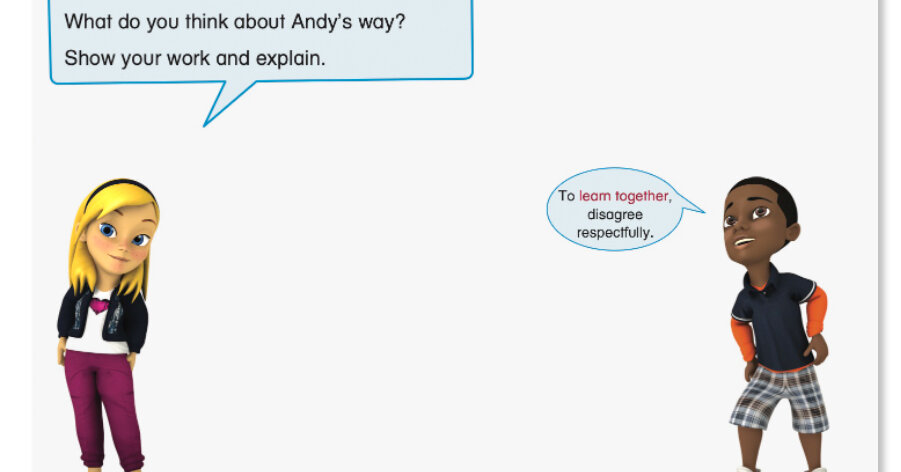
After the Florida Department of Education rejected dozens of math textbooks last week, the big question was, Why?
The department said some of the books “contained prohibited topics” from social-emotional learning or critical race theory — but it has released only four specific textbook pages showing content to which it objects.
Using online sample materials provided by publishers to Florida school districts, The New York Times was able to review 21 of the rejected books and see what may have led the state to reject them. Because Florida has released so few details about its textbook review process, it is unknown whether these examples led to the rejections. But they do illustrate the way in which these concepts appear — and don’t appear — in curriculum materials.
In most of the books, there was little that touched on race, never mind an academic framework like critical race theory.
But many of the textbooks included social-emotional learning content, a practice with roots in psychological research that tries to help students develop mind-sets that can support academic success.
The image below, from marketing materials provided by the company Big Ideas Learning — whose elementary textbooks Florida rejected — features one common way teachers are trained to think about social-emotional learning.
The circular diagram names the five core skills students should develop: self-awareness, self-management, responsible decision-making, social awareness and relationship building. This framework was developed by CASEL, an education nonprofit.
Until recently, the idea of building social-emotional skills was a fairly uncontroversial one in American education. Research suggests that students with these skills earn higher test scores.
But right-wing activists like Chris Rufo, senior fellow at the Manhattan Institute, have sought to tie social-emotional learning to the broader debate over the teaching of race, gender and sexuality in classrooms.
In a March interview conducted over email, Mr. Rufo stated that while social-emotional learning sounds “positive and uncontroversial” in theory, “in practice, SEL serves as a delivery mechanism for radical pedagogies such as critical race theory and gender deconstructionism.”
“The intention of SEL,” he continued, “is to soften children at an emotional level, reinterpret their normative behavior as an expression of ‘repression,’ ‘whiteness,’ or ‘internalized racism,’ and then rewire their behavior according to the dictates of left-wing ideology.”
Mr. Rufo also raised concerns that social-emotional learning requires teachers “to serve as psychologists, which they are not equipped to do.”
Gov. Ron DeSantis of Florida has spoken more generally about social-emotional learning as a distraction, in his view, from math itself.
“Math is about getting the right answer,” he said at a Monday news conference, adding, “It’s not about how you feel about the problem.”
Stephanie M. Jones, a developmental psychologist and expert on social-emotional learning at the Harvard Graduate School of Education, disagreed.
“Feelings arise all the time — they arise when we’re doing work at our offices, and when kids are learning things,” she said. “It makes sense to try and engage those feelings or grapple with them in order to be more effective at the thing we’re doing.”
Soothing Math Anxiety
Many of the rejected textbooks do prompt students to consider their emotions. In a McGraw Hill fifth-grade book, shown below, students are encouraged at the beginning of the school year to write a “math biography” reflecting on their feelings about the subject and how they expect math skills could help them enjoy hobbies or achieve goals.
“A math biography is a way of helping kids,” Professor Jones said. “There is a fair amount of evidence that indicates that if you can surface your uncertainty and anxiety about something, it’s easier to grapple with it and manage it.”
Teachers could read the biographies to learn which students need extra support, she added.
Some McGraw Hill pages include social-emotional prompts that have little to do with the math problems, such as this example below from a fifth-grade book. Beneath an ordinary math problem, students are asked, “How can you understand your feelings?”
Giving Students a ‘Growth Mind-set’
Some of the theories linked to social-emotional learning have permeated deep into popular culture and the business world. Among the most popular are the concept of a “growth mind-set,” developed by Carol Dweck of Stanford, and the closely related idea of “grit,” developed by Angela Duckworth of the University of Pennsylvania.
These theories have at times attracted more critique from the left than from the right. Some educators worried that the field of social-emotional learning celebrated behaviors associated with white, upper-middle-class culture, and paid too little attention to the kind of grit it takes to grow up in poverty, for example, or to overcome barriers of race, language and class that can make it more difficult for many students to persevere academically.
Conservative education experts, on the other hand, often lauded efforts to teach “character,” a concept that overlaps significantly with social-emotional learning.
Understand the Debate Over Critical Race Theory
The textbooks that Florida rejected are filled with references to character traits like perseverance and cooperation. A first-grade textbook from the publisher Savvas Learning Company, formerly known as Pearson K12 Learning, repeatedly refers to the importance of “effortful learning,” “learning together” and having a “growth mind-set.” Throughout the book, cartoon children pop up at the sides of pages to remind students of these ideas:
High school books, too, draw from these concepts. A rejected geometry textbook from the publisher Study Edge, shown below, prompts students to rate, from 1 to 4, how willing they are “to try new things” in math or “persevere when something is challenging.”
Accelerate Learning, a Houston-based company, had more elementary math textbooks approved by Florida than any other publisher. Sample materials show that their texts tend to include fewer overt references to feelings or emotions, but they do emphasize, in some activities, the importance of a student’s mind-set or attitude toward math.
Over the past year, as Republican Party activists increasingly focused on what they call the excesses of progressive education, social-emotional learning came under fire.
In June 2021, the Florida Department of Education sent a memo to the publishers of math textbooks, advising them not to include “social-emotional learning and culturally responsive teaching” in their materials.
Timothy Dohrer, director of teacher leadership at Northwestern University, called that “shortsighted” and said research showed that incorporating social-emotional learning into texts helped students learn social skills.
“If you asked 100 C.E.O.s what skills they want in a new hire, the top five skills are going to be about social-emotional learning — not algebra,” he said.
“Are you a nice person to talk to? Are you going to be a good co-worker?” Professor Dohrer added. “We know that the best way to teach that is to combine it with math, social studies, whatever.”
Race and Diversity
Professor Dohrer said that, despite its importance, social-emotional learning has become wrapped up in a debate about critical race theory, which is generally not taught in K-12 schools but has become an object of alarm among those attacking efforts to teach a more critical history of race in America.
“SEL has no connection to critical race theory,” he said, “and yet it is being connected at local school board levels and local communities as well as in the national dialogue.”
There are few references to race throughout these math textbooks, though publishers often took care to include word problems with ethnically diverse names and foods like empanadas. But this rejected McGraw Hill pre-algebra textbook, shown below, did include mini-biographies of mathematicians through history, almost all of whom were women or people of color:
In a statement, Savvas said it would “work with the Florida D.O.E. to resolve any perceived issues” and said that it was common for publishers to revise materials to meet state standards. Other companies said they did not want to comment until they had time to review why their books were rejected. The publishers have 21 days to appeal the decisions under Florida state law.
Vincent T. Forese, president of the Tampa-based publisher Link-Systems International, which submitted curriculums for three high school math subjects that were turned down for reasons unrelated to social-emotional learning or critical race theory, questioned why the state made a splashy announcement that books had been rejected.
“I’m not sure what the value proposition of making an announcement like that is other than there’s political value in it,” he said.




